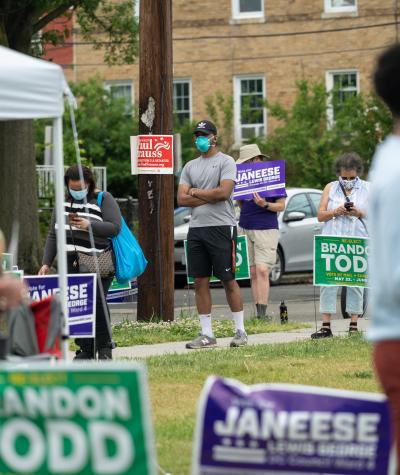Whatever our skin color, background or zip code, most of us believe that elections should be inclusive and accessible.
However, many voters in our country encounter an election system that is inaccessible and presents burdensome barriers to making our voices heard.
Whether we live in a small town or a big city, we need elections that voters can participate in freely and equally.
How can we ensure our elections are accessible for all? Here are some of the proven solutions to the biggest challenges faced by voters every Election Day:
Voters should not have to wait in line for hours to vote.
In 2020, nearly one in five in-person voters waited in line for more than 30 minutes to vote. This creates an unacceptable barrier for voters for all sorts of reasons. Voters may have caregiving obligations or may be forced to miss work or appointments due to an unreasonably long wait.
Many voters might be forced to leave the polling place before casting their ballot, or they might not show up at all. This results in voters being unable to make their voice heard and choose who represents them.
Long waits are often preventable. Unfortunately, they are sometimes deliberate. Some jurisdictions do not allocate enough resources for accessible in-person voting, or they do not open enough polling locations to fit the needs of their communities.
National standards for voting access would help mitigate long lines at the polls, along with sufficient state and local action. The For the People Act, which passed the U.S. House of Representatives as H.R. 1 in 2019 and 2021, would help ensure wait times at the polls would be kept at 30 minutes or less.
Nonpartisan volunteers should be able to provide food and water to voters standing in line if long lines force them to wait to vote.
Ideally, voters should not have to wait in long lines to vote. However, if voters must do so, it should not be a crime to distribute necessities to voters.
In March 2021, the state of Georgia—which often experiences long lines—restricted the ability of nonpartisan volunteers to distribute food and water to voters standing in line. States like Georgia should not make it a crime to help voters exercise their rights.
Voting locations should be accessible and predictable, and voters should have options for where to vote.
Voting locations should be easy to reach and accessible via public transportation. They should be plentiful, and voters should have flexibility of where they can vote. Voting centers—larger centers where voters from across a jurisdiction can gather to vote, regardless of their actual precinct—are a good idea and should be available to voters.
Voting locations should also be predictable, and any changes to voting locations should be accompanied by ample public notice before an election. Georgia’s 2021 voting law, for example, would allow the state to relocate polling places just 60 days before an election. Such a short notice can confuse voters.
Further, sometimes voters are penalized if they vote in a different precinct, either by accident or out of convenience or perceived necessity. A voter’s ballot shouldn’t be immediately tossed out if they voted in the wrong precinct.
Unfortunately, the U.S. Supreme Court recently upheld an Arizona policy declaring that ballots cast in the wrong precinct must not be counted, even for statewide or national races that appear on ballots in every precinct. The policies are anti-voter and don’t help voters make their voices heard.
Voters should be able to vote by mail, and mail voting should be accessible.
No matter what our zip code is, voters in every state should have the freedom to vote by mail.
Not only should vote by mail be an available option for Americans regardless of where we live, voters should have access to safe, secure dropboxes for depositing vote-by-mail ballots. This would ensure that voters have flexibility to cast their vote, and it helps prevent long lines at the polls.
Additionally, states shouldn’t use flawed signature match policies that result in ballots being unnecessarily tossed.
Voters should be able to vote early, so if they can’t vote on Election Day, they can still make their voices heard.
Expanding early voting opportunities would moreover make voting possible for workers who cannot take Election Day off work – an especially prevalent problem among lower-wage workers.
Early voting should be incorporated into national standards for voting access, so voters can vote early no matter their zip code. That’s why the For the People Act, which passed the U.S. House in 2019 and 2021, would ensure early voting is available nationwide.
Voters should be automatically registered to vote, and voters should be able to register to vote online.
Ensuring that voter registration is accessible and inclusive will help make the promise of democracy real for us all. Automatic and online voter registration would remove barriers for voters while keeping our elections secure.
Election Day should be a holiday, and employers should give voters paid time off to vote.
Workers should be able to vote without having to choose between their income and selecting who represents them.
Voters should not be forced to carry a specific type of ID to vote.
Identification policies should be inclusive and should not be a barrier for voters.
Accessible elections are good for everyone.
When Americans can make their voices heard, we can have a say in important matters that impact our lives, such as health care and economic well-being.
To help make our elections accessible, Congress should pass the For the People Act and the John Lewis Voting Rights Advancement Act now.
